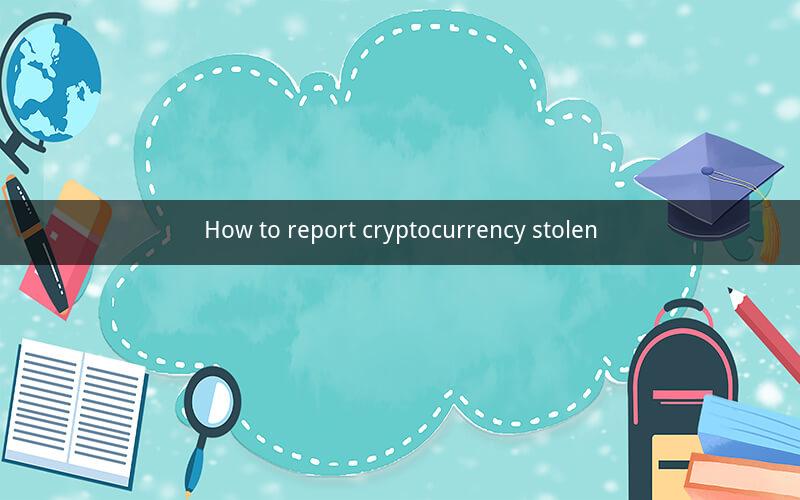
How to Report Cryptocurrency Stolen: A Comprehensive Guide
Table of Contents
1. Understanding Cryptocurrency Fraud
2. Identifying Stolen Cryptocurrency
3. Immediate Actions to Take
4. Reporting to Authorities
5. Contacting Exchanges and Platforms
6. Documenting the Incident
7. Seeking Legal Advice
8. Preventing Future Incidents
9. Supporting the Community
10. Conclusion
1. Understanding Cryptocurrency Fraud
Cryptocurrency fraud is a growing concern in the digital age. As the value of cryptocurrencies continues to rise, so does the number of fraudulent activities. It's crucial to understand the different types of cryptocurrency fraud to effectively report stolen assets.
2. Identifying Stolen Cryptocurrency
Identifying stolen cryptocurrency requires vigilance and quick action. Here are some common signs:
- Unusual transactions or wallet activity
- Missing funds from your digital wallet
- Alerts from your exchange or wallet provider
- Unrecognized addresses in your transaction history
3. Immediate Actions to Take
Once you suspect that your cryptocurrency has been stolen, take the following immediate actions:
- Change your passwords and enable two-factor authentication for all related accounts
- Notify your friends and family about the potential fraud
- Contact your exchange or wallet provider
4. Reporting to Authorities
Reporting the theft to authorities is essential for tracking down the criminals and preventing future incidents. Here's how to report stolen cryptocurrency:
- Local Law Enforcement: Contact your local police department and provide them with all the necessary information, including your wallet address, transaction history, and any evidence of the theft.
- Cybersecurity Agencies: Reach out to cybersecurity agencies like the FBI's Internet Crime Complaint Center (IC3) or your country's equivalent.
- Cryptocurrency Exchanges and Platforms: Inform the exchanges and platforms where your stolen cryptocurrency was last traded.
5. Contacting Exchanges and Platforms
Contact the exchanges and platforms where your stolen cryptocurrency was last traded. Provide them with the following information:
- Your wallet address
- Transaction ID
- The amount of cryptocurrency stolen
- Any evidence of the theft
Exchanges and platforms may freeze the suspicious accounts and investigate the incident further.
6. Documenting the Incident
Documenting the incident is crucial for both legal and personal purposes. Keep a record of all communications with authorities, exchanges, and platforms. Additionally, document the following:
- The date and time of the theft
- The amount of cryptocurrency stolen
- Any suspicious activity or transactions
- The steps you've taken to mitigate the damage
7. Seeking Legal Advice
Consulting with a legal professional can help you navigate the complexities of cryptocurrency fraud. A lawyer can provide guidance on the best course of action and represent you in legal proceedings if necessary.
8. Preventing Future Incidents
Preventing future incidents involves taking proactive measures to secure your cryptocurrency. Here are some tips:
- Use strong, unique passwords for all accounts
- Enable two-factor authentication
- Regularly backup your wallets
- Stay informed about the latest cybersecurity threats
- Use reputable exchanges and wallets
9. Supporting the Community
Supporting the cryptocurrency community is essential for combating fraud. Share your experience and provide guidance to others who may have fallen victim to cryptocurrency theft. Engage with online forums, social media groups, and local meetups to create a supportive network.
10. Conclusion
Reporting stolen cryptocurrency is a crucial step in recovering your assets and preventing future incidents. By understanding the process and taking immediate action, you can increase your chances of success. Remember to document the incident, seek legal advice, and support the community to create a safer and more secure cryptocurrency ecosystem.
Questions and Answers
1. What should I do if I suspect my cryptocurrency has been stolen?
- Change your passwords, notify your friends and family, and contact your exchange or wallet provider.
2. How can I identify stolen cryptocurrency?
- Look for unusual transactions, missing funds, or unrecognized addresses in your transaction history.
3. Should I report the theft to authorities?
- Yes, reporting the theft to local law enforcement, cybersecurity agencies, and relevant exchanges is crucial for tracking down the criminals.
4. What information should I provide when reporting the theft?
- Your wallet address, transaction ID, the amount of cryptocurrency stolen, and any evidence of the theft.
5. How can I prevent future incidents of cryptocurrency theft?
- Use strong passwords, enable two-factor authentication, regularly backup your wallets, and stay informed about cybersecurity threats.
6. What should I do if my stolen cryptocurrency is frozen by an exchange?
- Contact the exchange for more information and provide any additional evidence or information they request.
7. Can I recover my stolen cryptocurrency?
- The chances of recovering stolen cryptocurrency depend on the specific circumstances, but reporting the theft and working with authorities can increase your chances.
8. What legal rights do I have in the event of cryptocurrency theft?
- Consult with a legal professional to understand your rights and options in the event of cryptocurrency theft.
9. How can I support the cryptocurrency community in preventing fraud?
- Share your experience, engage with online forums and social media groups, and stay informed about the latest cybersecurity threats.
10. What is the role of cybersecurity agencies in investigating cryptocurrency theft?
- Cybersecurity agencies like the FBI's IC3 can assist in tracking down the criminals and providing support to victims of cryptocurrency theft.